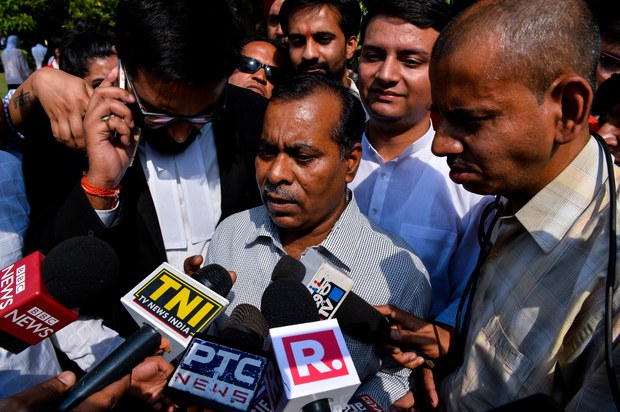India's Top Court Upholds Death Penalties for Delhi Gang-Rape Convicts
2017.05.05
New Delhi
 The father of Indian gang-rape victim “Nirbhaya” speaks to reporters as he leaves the Supreme Court in New Delhi, May 5, 2017.
The father of Indian gang-rape victim “Nirbhaya” speaks to reporters as he leaves the Supreme Court in New Delhi, May 5, 2017.
India’s Supreme Court showed no mercy Friday in upholding death sentences for four men convicted of gang-raping a woman who died of injuries from the 2012 assault, in a case that shocked the nation and led to tougher penalties against rapists.
The sexual assault committed aboard a moving public bus in the capital New Delhi was so gruesome and committed with the “highest viciousness” that it was a case where “human lust was allowed to take such a demonic form,” the court said in its 429-page verdict.
In handing down the ruling, the three-judge bench of the nation’s highest court said it did not have “even a hint of hesitation” in deciding against sparing the lives of the four convicts by converting their sentences to life in prison, and noted that “crimes like the one before us cannot be looked at with magnanimity.”
On Dec. 16, 2012, the 23-year-old victim, a medical student who was later given the name Nirbhaya, or “fearless,” by the Indian media, was gang-raped inside a bus in front of a male friend who was accompanying her.
There were six perpetrators in all, including a minor. The assailants repeatedly inserted iron rods into the victim, causing her intestines to gush out before they threw the woman and her friend off the bus.
The rape victim, who cannot be identified by her real name as per Indian laws, died of her injuries two weeks later at a Singapore hospital where she was flown for treatment.
“I am satisfied. We now finally see a glimmer of hope that the culprits would soon get what they deserve – to be hanged,” Asha Devi, the victim’s mother, told BenarNews on Friday.
“During the hearing, I felt that the court understood our plight,” she added.
Ram Singh, the victim’s father, said he “will now be able to sleep in peace.”
“She [Nirbhaya] would have turned 28 on May 10 if she had lived. Today’s verdict is a gift for her,” Singh told reporters as he stepped out of the courthouse in New Delhi with his wife.
“I am happy that the court has heard our voice and understood the suffering our daughter underwent,” he said, adding the culprits should be hanged as soon as possible.
Amid nationwide outrage and a raging debate over the treatment of Indian women that followed his daughter’s fatal gang-rape, the government in March 2013 approved tougher anti-rape laws, allowing culprits to be sentenced to death if they were repeat offenders, or depending on the brutality of the assault.
‘Death is certainly not the answer’
The four men sentenced to death are Akshay Thakur, 31, Vinay Sharma, 23, Pawan Gupta, 22, and Mukesh Kumar, 29. Another defendant, Ram Singh, allegedly committed suicide in Delhi’s Tihar Jail in March 2013, while the sixth person, a juvenile, was sentenced to three years in a reform home.
In 2013, a trial court sentenced Thakur, Sharma, Gupta and Kumar to capital punishment. The verdict was upheld by the High Court in 2014, following which the convicts appealed to the Supreme Court for leniency.
The convicts now have the right to file a petition before the Supreme Court to review its verdict. If that is rejected, only the president of India has the authority to commute their death sentences to life imprisonment.
While some women’s rights activists came out in support of the verdict, others had a different opinion.
“Justice in this kind of crime was certainly needed but death is certainly not the answer. This method of punishment needs to be debated,” gender-rights activist Sarita Barpanda, director of the New Delhi-based Human Rights Law Network, told BenarNews.
“By giving them death, you have not given them any scope for repentance,” she added.
Lawyer M.L. Sharma, who defended the convicts, said the verdict was a “grave error” on the part of the Supreme Court.
“I am shocked by the verdict. Undoubtedly, the person who commits a crime should be punished but not innocent people. The verdict is a result of a media trial,” Sharma told BenarNews.
“It was the court’s duty to deliver its verdict based on truth and evidence and not based on socialist or political agendas,” he said.







